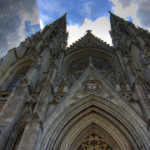The coronavirus pandemic has confronted communities and governments around the world with coordination and mobilization challenges similar to, though distinct from, those in wartime. It also confronts us with difficult policy challenges involving tradeoffs and uncertainty. All this raises the question of how decision-making occurs in a free, healthy society, both in normal times and in periods of crisis. For simplicity, let’s say three orders compose a free and healthy society: experts, politicians, and the public. Each has a role to play in the decision-making processes.
Experts
The expert is a specialist in a particular field of knowledge, such as public health. Scientists, doctors, and experts of various kinds bring crucial information, analysis, and projections of possible futures to the table. The expert gives advice, information, and explanation. But the expert is not the final decision-maker. Why not?
First, there are epistemological reasons. Precisely because the expert is narrowly focused, she is not best suited to consider the interrelationship between her specialization and the good of the whole society. In the current crisis, studies like the one by Neil Ferguson and colleagues at Imperial College that have guided policy in the United Kingdom openly acknowledge they have not considered the economic and social costs of their policy recommendations. In an illuminating essay, Roger Koppl points out that experts in different fields necessarily operate in silos, and there is not a rational method of integrating insights from different fields into actionable knowledge.
Start your day with Public Discourse
Sign up and get our daily essays sent straight to your inbox.Even in her field, the expert is not clairvoyant. Expertise is not magic. Indeed, part of expertise is recognizing and describing the degree of uncertainty we have about relevant phenomena. Public health experts who inform U.S. pandemic policy at the national level have frankly acknowledged the uncertainty they are working with. The president’s team announced on Tuesday, March 31 that models they were relying on predicted between 100,000 and 240,000 American deaths from the virus, even with the social distancing measures that states and localities had implemented. Dr. Deborah Birx said the U.S. could see up to 200,000 deaths even “if we do things almost perfectly.” But Dr. Birx also said, “We are hoping that the models are not completely right. That we can do better than what the predictions are.” Dr. Anthony Fauci echoed this uncertainty in an interview with Jake Tapper at CNN, as relayed in New York Magazine’s Intelligencer:
Looking at what we’re seeing now, you know I would say between 100,000 and 200,000 cases, but I don’t want to be held to that. Because it’s—excuse me, deaths. We’re going to have millions of cases. But I just don’t think that we really need to make a projection when it’s such a moving target that you could so easily be wrong and mislead people.
A glance at the uncertainty intervals in the models these experts were looking at, along with subsequent updates to the projections, helps explain why Dr. Fauci did not want to be held to a specific prediction.
Furthermore, the uncomfortable reality is that experts can be, and often have been, just plain wrong. Worse, they are hard to challenge precisely because of their specialized expertise and prestige. In works including The Vision of the Anointed, Thomas Sowell makes the case that American policy experts have accepted a vision of society and of the role of experts that blinds them to empirical reality and insulates them from criticism, despite a series of signal policy failures in economics, criminal justice, and social policy.
There are also institutional and moral reasons for removing direct decision-making responsibility from the experts. The expert is not directly accountable to the public for the results of decisions. Indeed, the expert cannot be fully accountable to the public, for her task is to seek accuracy and truth in her field without regard for public opinion. Ceding decision-making authority to experts would give them undue power to mold society, creating a technocracy and raising the question C. S. Lewis poses in The Abolition of Man: who conditions the conditioners?
We should remember that experts don’t only, or perhaps even primarily, inform political leaders. They inform members of the public directly. Doctors and lawyers constantly inform decision-making at the personal and community level all over the world. Indeed, this role has been important during the COVID-19 pandemic, since it has required not only governmental decisions, but also more generally coordinated changes in behavior. I have been following updates from the Brazos County Public Health District and daily Facebook posts from Dr. Louis P. Coates in North Texas—a helpful and informative public service he is providing. Likewise religious teachers and leaders serve in a certain expert capacity, again in direct communication with the public. The Compendium of the Social Doctrine of the Church intriguingly describes the Catholic Church as an “expert in humanity,” offering her services and heavenward gaze “to every person, in order to help people to live their lives in the dimension of authentic meaning.”
Experts have a key role to play in informing decision-making, but they are not the final decision-makers. The expert should be on tap, but not on top, as the famous saying goes.
Politicians
By contrast, the political leader is primarily responsible for making decisions. Casting votes, establishing regulations, making recommendations—these are the functions of the various political and bureaucratic offices. Public policy—the “art of government” as opposed to the science of policy analysis—is about making decisions and establishing laws and social practices that allocate resources and structure incentives in a manner that serves the public interest. Unlike the expert, the political leader is a generalist, responsible for considering inputs from a variety of sources and thinking holistically about the good of the public to which he is accountable. While I grant there is no scientific method for integrating inputs from all these sources, I would quibble with Koppl’s view above that there is no rational means of doing so. This rationality is practical reason, based on prudence, the political virtue par excellence.
The politician is also accountable to the public in a much more direct way than the expert. Accountability to the public does not amount to kowtowing or demagoguery. The good politician must balance receptivity to public input with responsibility to lead. As Edmund Burke argued in his famous Speech to the Electors of Bristol, there are times when he must oppose his constituents’ wishes in order to serve the larger public interest. Likewise, Publius described in The Federalist, No. 63, the role of senators as ensuring that the “deliberate sense of the community” prevail, especially when “some strong passion or momentary interest” might make “measures which [the people] themselves will afterwards be the most ready to lament and condemn” attractive. Abraham Lincoln also wrestled with the challenge of “public sentiment,” the constraint it puts on politicians’ actions, and the art of persuasion the good politician must employ to “mold” public sentiment if it is in the wrong.
The politician is informed by experts, but accountable to the public. He is entrusted with decision-making authority in a particular sphere affecting the public interest.
The Public
That brings us to the public, which also plays a key but indirect role in decision-making. Decisions are to be made in the public interest, so the public must have a significant role. That role involves both input and feedback that helps define the public interest and keep politicians accountable to it.
Melissa Lane argues that the practice of holding political officeholders accountable stretches back to ancient Athens, in which the assembly would hold the Archons, chosen by lot, to account:
In Athens, accountability procedures and the control of public office gave the people as a whole an important role in defining, revealing and judging the misuse of office. It helped them hold every official accountable for his use of his office. From this classical practice, we can see a way to revitalize the dysfunctional accountability regimes under which we are currently suffering.
She points out that Cicero also thought some of the Athenian accountability practices superior to those of the Roman Republic.
As with the public to which Lincoln was accountable, the people can be fickle, divided, or plain wrong. Nevertheless, the ideal of a free society is based on the “democratic faith” that people have some degree of ability to exercise good judgment about their own interests and the public interest. They have at least an ability to recognize whether officeholders and experts are informing and leading in ways that respect these interests. This kind of commonsense judgment, informed by both experts and political leaders, has been on display in Americans’ response to the pandemic.
While not holding the decision-making office, members of the public appropriately constrain politicians in their choices and hold officials accountable for making decisions in their interests, thus playing an important role in the decision-making process.
Different Offices, Different Roles
The question is not whether the analysis of the experts, the prudence of the politicians, or the commonsense wisdom of the public should have the most sway. In a free society, each of us must discharge the functions of our orders and offices well. As we know, experts, politicians, and the public can all do this with varying degrees of perspicacity and integrity. Experts can overreach, politicians can be corrupted, and common sense can deteriorate into popular delusion.
David T. Koyzis provides a helpful and relevant point:
In just war theory, the primary agent responsible for determining the justice of a contemplated military action is the duly constituted political authority itself, in much the same way that a judge or jury are responsible to determine the guilt or innocence of a defendant on trial. The role played by individual citizens in either of these is necessarily secondary, in part because of the lack of sufficient information available to those not occupying such authoritative offices. In short, we citizens may come to a preliminary assessment, but of necessity such assessment lacks the certainty we might wish for, as well as an authoritative character.
Koyzis’s argument, though focused on judging actions after the fact, is relevant to the question of how different orders and offices should be involved in decision-making. The primary decision-making agent is the “duly constituted political authority,” supplied with information and analysis from experts. The public participates actively in the assignment to political agents of responsibilities and functions, and in the assessment of their performance in discharging their duties, both in public discussion and in future assignments of authority.
I think my home state of Texas is reasonably approximating this model. On Friday, April 17, Governor Greg Abbott released an executive order outlining plans for a phased, limited reopening. He consulted with public health experts and gained the backing of the Texas Public Health coalition, but the plan does not quite track with the recommendations of many public health experts or even the new White House guidelines. In particular, as some Democrats in the Texas legislature have pointed out, the plan does not treat robust testing and tracing capacity as a prerequisite for starting to reopen, though the governor has charged a task force with developing such capacity. But the governor also has to be responsive to input from businesses and members of the public whose priority is getting the economy going again. The Governor’s job is to make the decision, informed by experts and accountable to the public, and that’s roughly what has occurred. He is running for reelection for a third term in 2022, which will serve as the primary mechanism of accountability for his decision-making.
We’ll see what happens. Governor Abbott is not the only decision-maker; county and city officials will be making similar decisions adapted to their local contexts, with input from local public health officials and the public. The process is by no means neat and tidy; there has been some rough-and-tumble negotiation between and among state and local officials, and that will likely continue. Further, we should bear in mind that the scope of decision-making during this pandemic is far outside the normal scope of executive authority, appropriate only in a state of emergency. For instance, closing down businesses or limiting gathering sizes without basis in a legislative act is not a normal power of the executive office in our constitutional tradition.
Life in a free society does not guarantee perfect decision-making, but neither does any system. The free society does secure the members of each order the space to exercise their proper functions, subject to appropriate constraints. Ultimately, none of the orders is “on top.” In a free, well-functioning society, we all do our part and no more.
In the challenging weeks, months, and perhaps years ahead, one task is to more fully appreciate the roles and responsibilities of different orders and offices in a free society, so we may discharge them in a manner becoming citizens, not subjects.














